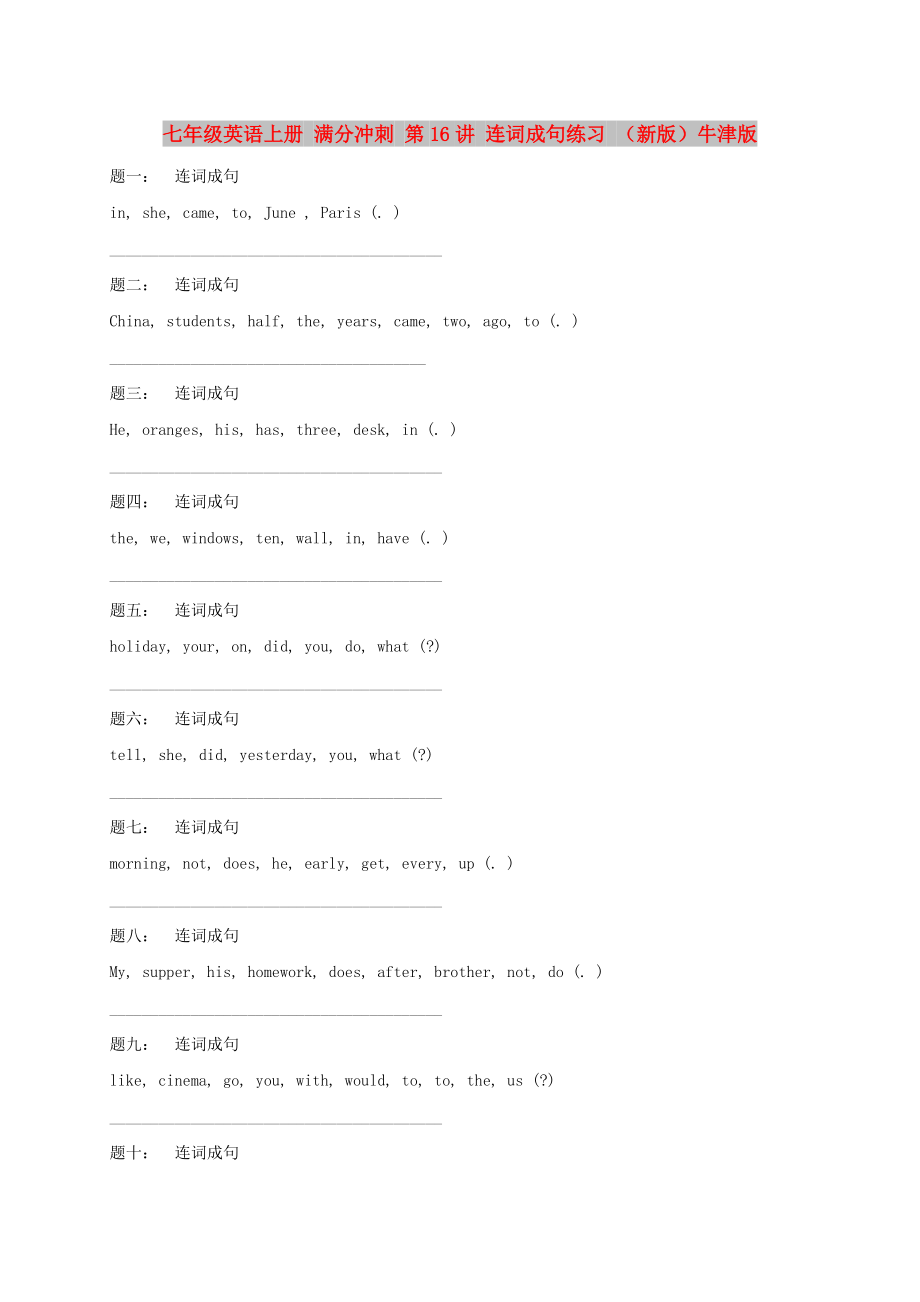《七年級(jí)英語(yǔ)上冊(cè) 滿(mǎn)分沖刺 第16講 連詞成句練習(xí) (新版)牛津版》由會(huì)員分享,可在線(xiàn)閱讀��,更多相關(guān)《七年級(jí)英語(yǔ)上冊(cè) 滿(mǎn)分沖刺 第16講 連詞成句練習(xí) (新版)牛津版(4頁(yè)珍藏版)》請(qǐng)?jiān)谘b配圖網(wǎng)上搜索��。
1��、七年級(jí)英語(yǔ)上冊(cè) 滿(mǎn)分沖刺 第16講 連詞成句練習(xí) (新版)牛津版
題一: 連詞成句
in, she, came, to, June , Paris (. )
_________________________________________
題二: 連詞成句
China, students, half, the, years, came, two, ago, to (. )
_______________________________________
題三: 連詞成句
He, oranges, his, has, three, desk, in (. )
_________
2��、________________________________
題四: 連詞成句
the, we, windows, ten, wall, in, have (. )
_________________________________________
題五: 連詞成句
holiday, your, on, did, you, do, what (?)
_________________________________________
題六: 連詞成句
tell, she, did, yesterday, you, what (?)
_____________________
3��、____________________
題七: 連詞成句
morning, not, does, he, early, get, every, up (. )
_________________________________________
題八: 連詞成句
My, supper, his, homework, does, after, brother, not, do (. )
_________________________________________
題九: 連詞成句
like, cinema, go, you, with, would, to, to, the
4��、, us (?)
_________________________________________
題十: 連詞成句
in, would, the, like, you, bike, park, to, ride, a (?)
_________________________________________
題十一: 連詞成句
do, evening, for, they, walk, every, go, a (?)
_________________________________________
題十二: 連詞成句
window, he, day, does, th
5��、e, open, every (?)
_________________________________________
連詞成句
題一: She came to Paris in June.
解析:主語(yǔ)是she��,謂語(yǔ)動(dòng)詞是came to,賓語(yǔ)是Paris��,時(shí)間狀語(yǔ)是in June��。所以填She came to Paris in June.
題二: Half the students came to China two years ago.
解析:主語(yǔ)是Half the students��,謂語(yǔ)動(dòng)詞是came to��,賓語(yǔ)是China��,時(shí)間狀語(yǔ)是two years ago��。所以填
6��、Half the students came to China two years ago.
題三: He has three oranges in his desk.
解析:主語(yǔ)是He��,謂語(yǔ)動(dòng)詞是has��,賓語(yǔ)是three oranges��,地點(diǎn)狀語(yǔ)是in his desk��。所以填He has three oranges in his desk.
題四: We have ten windows in the wall.
解析:主語(yǔ)是We��,謂語(yǔ)動(dòng)詞是have��,賓語(yǔ)是ten windows,地點(diǎn)狀語(yǔ)是in the wall��。所以填We have ten windows in the
7��、wall.
題五: What did you do on your holiday?
解析:在疑問(wèn)句中��,what是特殊疑問(wèn)詞��,放句首��,后接助動(dòng)詞did��,主語(yǔ)是you��,謂語(yǔ)動(dòng)詞是do��,時(shí)間狀語(yǔ)是on your holiday��。所以填What did you do on your holiday?
題六: What did she tell you yesterday?
解析:在疑問(wèn)句中��,what是特殊疑問(wèn)詞��,放句首��,后接助動(dòng)詞did��,主語(yǔ)是she��,謂語(yǔ)動(dòng)詞是tell��,賓語(yǔ)是you��,時(shí)間狀語(yǔ)是yesterday��。所以填What did she tell you yesterday?
題
8��、七: He does not get up early every morning.
解析:主語(yǔ)是He��,謂語(yǔ)動(dòng)詞是does not get up��,狀語(yǔ)是early every morning��。所以填He does not get up early every morning.
題八: My brother does not do his homework after supper.
解析:主語(yǔ)是My brother��,謂語(yǔ)動(dòng)詞是does not do��,賓語(yǔ)是his homework��,時(shí)間狀語(yǔ)是after supper��。所以填My brother does not do his hom
9��、ework after supper.
題九: Would you like to go to the cinema with us?
解析:在疑問(wèn)句中,Would you like to用來(lái)禮貌地詢(xún)問(wèn)對(duì)方的意愿��,后接詞組go to the cinema��,再接with us��。所以填Would you like to go to the cinema with us?
題十: Would you like to ride a bike in the park?
解析:在疑問(wèn)句中��,Would you like to用來(lái)禮貌地詢(xún)問(wèn)對(duì)方的意愿��,后接詞組ride a bike��,地點(diǎn)狀語(yǔ)是in
10��、the park��。所以填Would you like to ride a bike in the park?
題十一: Do they go for a walk every evening?
解析:在一般疑問(wèn)句中��,助動(dòng)詞是do��,主語(yǔ)是they��,謂語(yǔ)動(dòng)詞是go for a walk��,時(shí)間狀語(yǔ)是every evening��。所以填Do they go for a walk every evening?
題十二: Does he open the window every day?
解析:在一般疑問(wèn)句中��,助動(dòng)詞是does��,主語(yǔ)是he��,謂語(yǔ)動(dòng)詞是open��,賓語(yǔ)是the window��,時(shí)間狀語(yǔ)是every day��。所以填Does he open the window every day?
 七年級(jí)英語(yǔ)上冊(cè) 滿(mǎn)分沖刺 第16講 連詞成句練習(xí) (新版)牛津版
七年級(jí)英語(yǔ)上冊(cè) 滿(mǎn)分沖刺 第16講 連詞成句練習(xí) (新版)牛津版

